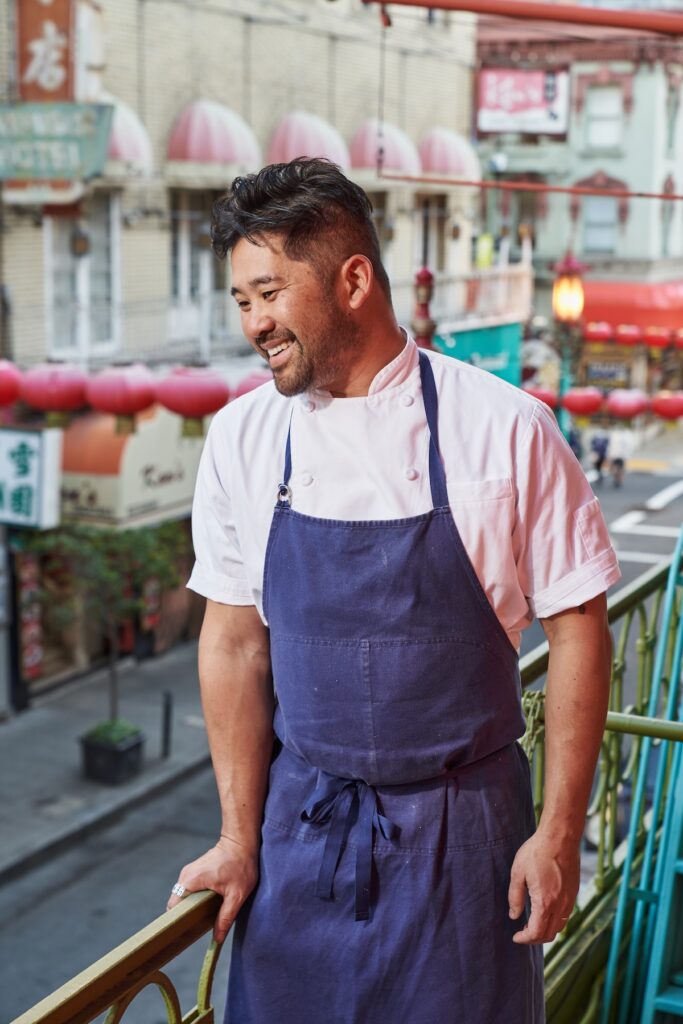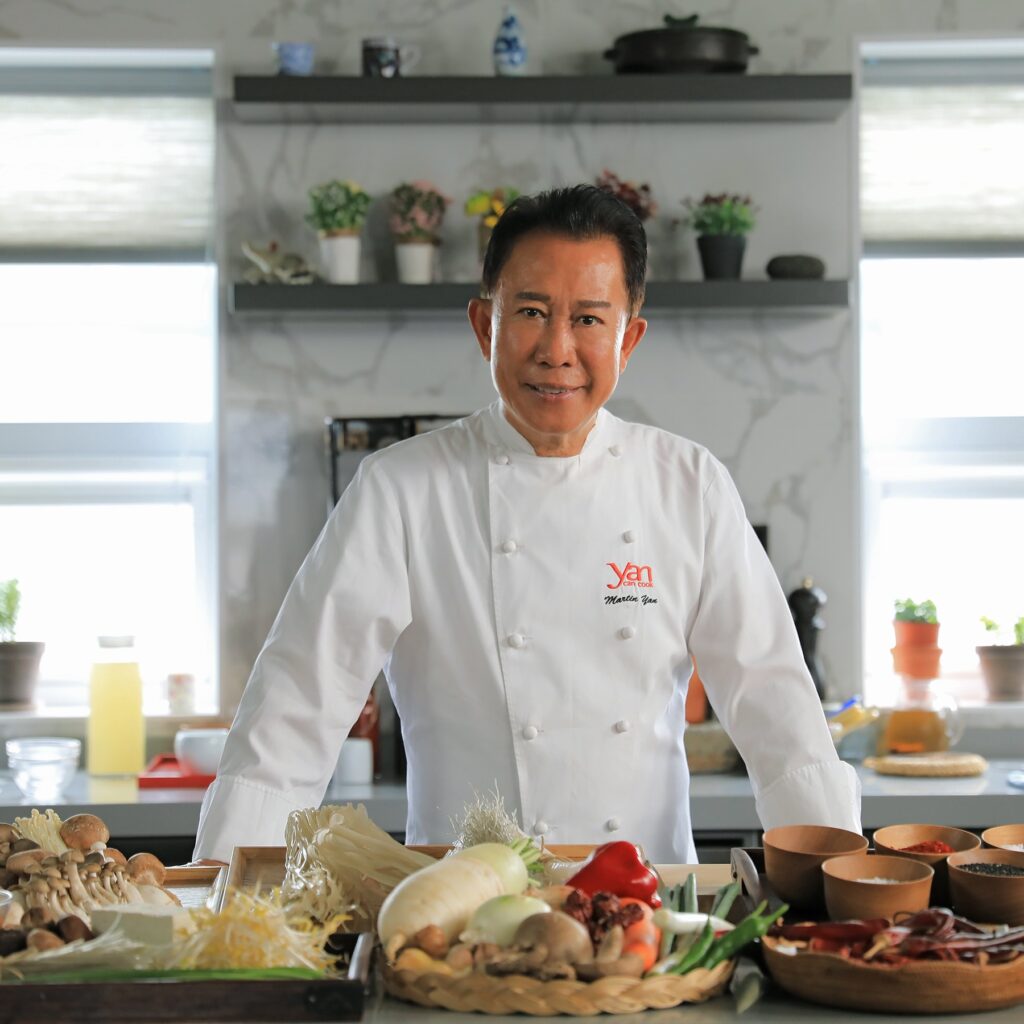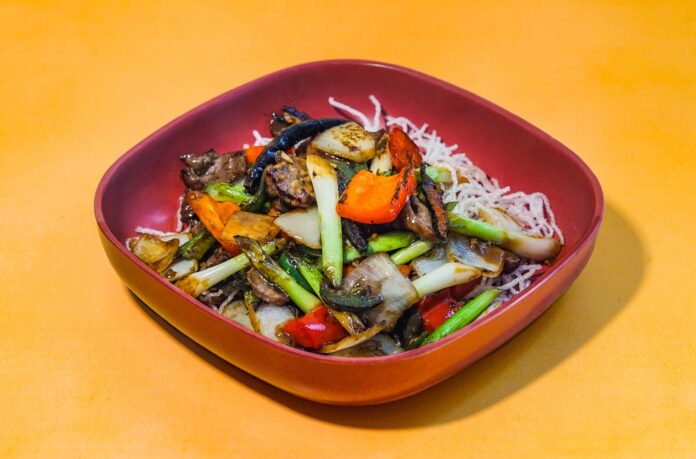To mark Asian American and Pacific Islander (AAPI) Heritage Month, two culinary superstars—Brandon Jew and Martin Yan—are joining forces in a collaboration that bridges generations, honors cultural legacy, and redefines Chinese-American cuisine.
Combining their culinary perspectives and shared love of this bold, flavorful fusion fare—Jew, the James Beard Award-winning chef behind San Francisco’s Michelin-starred Mister Jiu’s, Moongate Lounge, and Mamahuhu, and Yan, the namesake of groundbreaking PBS series “Yan Can Cook”—have crafted a special Mongolian Beef dish, available this May at all Mamahuhu locations.
The entrée, a staple at Chinese-American restaurants, originated in Taiwan’s Mongolian barbecues, an adaptation of the Northern Chinese dish, Mongolian Lamb, itself inspired by traditional mutton-heavy Mongolian cuisine. Chef Martin Yan further reinvented the dish in one of his most-viewed episodes of “Yan Can Cook.”
Jew and Yan’s latest reinterpretation, developed in the Mamahuhu kitchen using Yan’s signature techniques, features locally sourced and marinated Niman Ranch sirloin prepared with fresh onions, bell peppers, scallions, Sichuan spices, arbol chiles, jalapeños, and crispy noodles.
“We wanted to do something that felt rooted in tradition but had a fresh take,” says Jew. “We leaned into quality, locally-sourced ingredients, and, of course, the bold flavors that define Mongolian beef. It was about bringing those familiar flavors together while keeping the execution sharp and modern.”
Exemplifying the synergy of tradition and innovation that both chefs champion, this collaboration is more than just a dish—it’s a flavorful tribute, celebration, and multigenerational pastiche.
For Jew, this partnership represents a full-circle moment, working with the celebrity chef, media mogul, and cultural ambassador who raised the profile of Chinese food and made it accessible to American home cooks.

“Martin’s impact on me has been profound,” Jew says. “‘Yan Can Cook’ was a game-changer. “Growing up watching ‘Yan Can Cook’ and learning so much from Martin, it feels surreal to be able to collaborate with him now. Martin paved the way for me and other Chinese-American chefs to be playful with our cuisine. All the things Martin did allowed me to be the chef I am today.”
Help us save local journalism!
Every tax-deductible donation helps us grow to cover the issues that mean the most to our community. Become a 48 Hills Hero and support the only daily progressive news source in the Bay Area.
Yan, now in his fifth decade as a culinary educator and personality, continues to be deeply invested in San Francisco’s Chinatown and its chefs. Watching Jew establish Mamahuhu and reimagine the classics of Chinese-American cuisine has filled him with pride.
“Chinatown has been my home away from home for more than half a century,” he says. “And Brandon is more than a rising star there—he’s a generational talent. I am so proud he’s chosen to share his talent in Chinatown.”
For Jew, food has always been about more than sustenance—it’s a means of expressing identity and history. He hopes that through this new twist on Mongolian Beef, diners will gain a deeper appreciation for Chinese-American food as a living, evolving tradition that tells stories and fosters connections.
“I think that shows in how two chefs with two Mongolian Beef recipes, 40-some years apart, can play off of each other,” says Jew.
Yan echoes this sentiment, emphasizing food’s role as a cultural bridge. And in a city like San Francisco—home to one of the oldest and most dynamic Chinatowns in America, drawing 2 to 3 million visitors per year—food remains a unifying force.
“Brandon and I share a passion for food,” says Yan. “Food connects people—it has no national or international boundaries. This collaboration is a celebration of our diverse culture and heritage.”
The Bay Area’s incredible diversity and agricultural bounty provide an ideal canvas for chefs like Jew to push the envelope while staying rooted in heritage. Fresh produce, high-quality meats, and an open-minded food culture enable bold experimentation grounded in authenticity.
Mamahuhu itself is a reflection of contemporary Chinese-American identity—fast-casual, chef-driven, and deeply intentional about quality and community. Jew co-founded the eatery with Anmao Sun and Ben Moore, and together they’ve created not just a restaurant, but a space for cultural connection.
That’s why Mamahuhu is also celebrating AAPI Heritage Month with a full slate of community-building events, including weekly mahjong gatherings and a special book signing on May 12 with Nicole Wong of The Mahjong Project, who recently published Mahjong: House Rules from Across the Asian Diaspora.
As the two chefs reflect on their respective journeys, both point to the Bay Area as a wellspring of inspiration.
Jew feels fortunate to have grown up surrounded by vibrant cultural influences, especially in a city with a thriving Chinatown. That backdrop helped him see the value of preserving and reimagining Chinese-American food.
But what about the small towns across the US that had little to no representation of Asian fare?
Yan, ever the educator, recalls how difficult it once was to find even basic Chinese ingredients outside major cities. Today, thanks in part to his decades of advocacy, bean sprouts, bok choy, and hoisin sauce are staples across the US.

“When I first started the ‘Yan Can Cook Show,’ I visited parts of the US, far away from San Francisco’s Chinatown,” he says. “I remember how difficult it was to find some of the most basic Chinese ingredients, like fresh mung bean sprouts. Fast forward 50 years, and now you can find fresh bean sprouts any day in Kansas City at Whole Foods and Kroger. If I can be named in the history books as the man who brought bean sprouts to Kansas, like Johnny Appleseed, I will consider my career to be a real success.”
Both Yan and Jew have also worked, in their respective ways, to challenge the negative misperceptions of Chinese-American cuisine in mainstream media, where it has often been dismissed as either greasy takeout or not “authentic” enough.
Yan did it through his television show, where he broke barriers and opened minds with each episode. Jew does it through his restaurants, where the food honors tradition while welcoming innovation.
“In my humble way, I am honoring the Chinese traditions in the kitchen by updating and adapting old, trusted recipes to today’s environment,” says Yan. “In a way, you can say that I am starting a new tradition.”
Looking to the future, Yan has embraced the digital age with gusto. He now connects with fans and communities through Zoom cooking classes, TikTok collaborations, and other online platforms. He views digital media as a powerful new frontier for cultural exchange, education, and culinary creativity.
“Why not?” he jokes. “They ‘tik’ and Martin Yan ‘toks’.”
Together, Jew and Yan are proving that Chinese-American cuisine isn’t just part of the past; it’s a vital, delicious part of the future that both chefs hope to continue evangelizing every May and year-round.
“For me, this collaboration is all about honoring the incredible influence of Martin on the Chinese-American culinary scene,” says Jew. “It is a way for me to express my respect for his legacy and also bring our shared love for Chinese-American cuisine to a wider audience during such an important month.”





